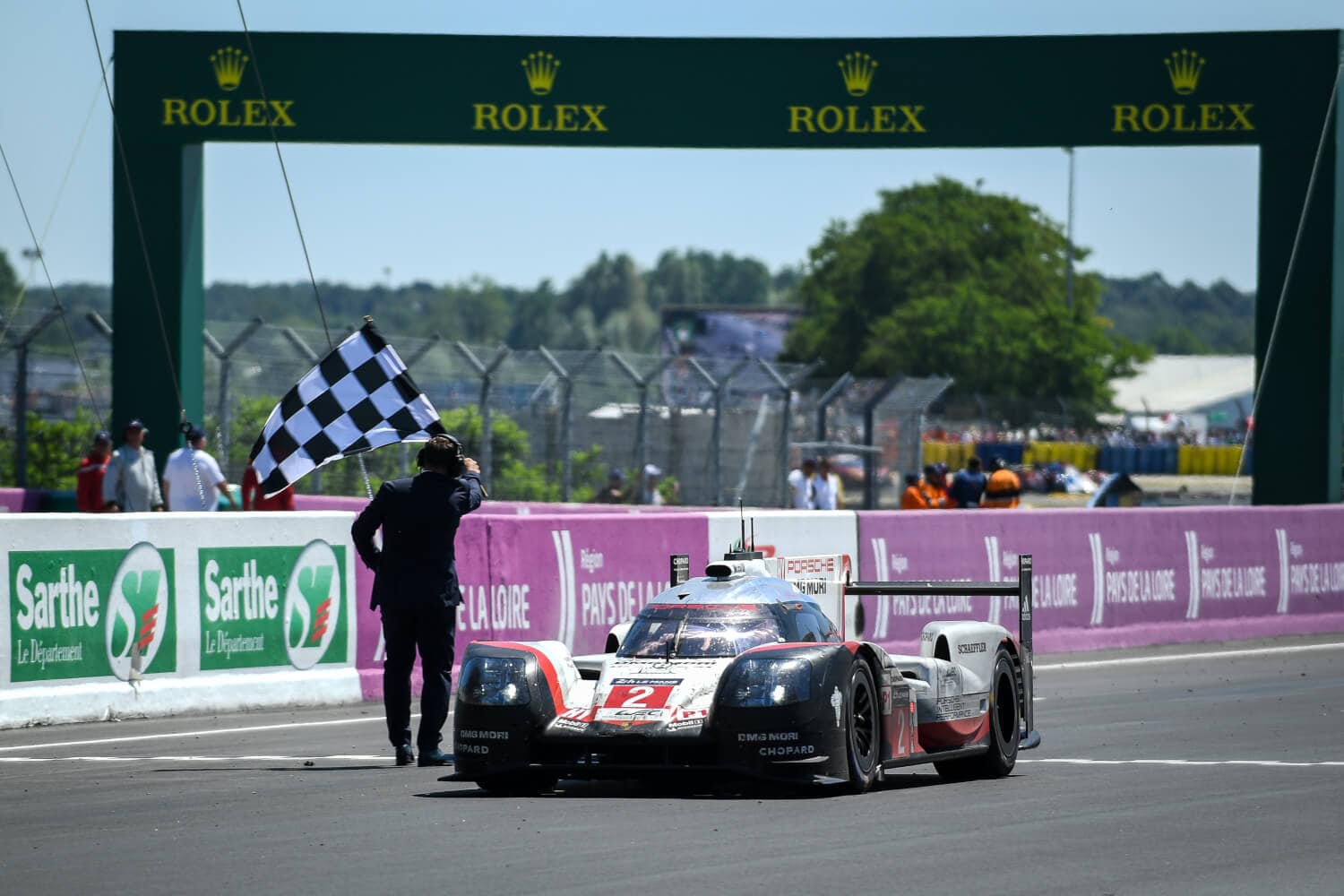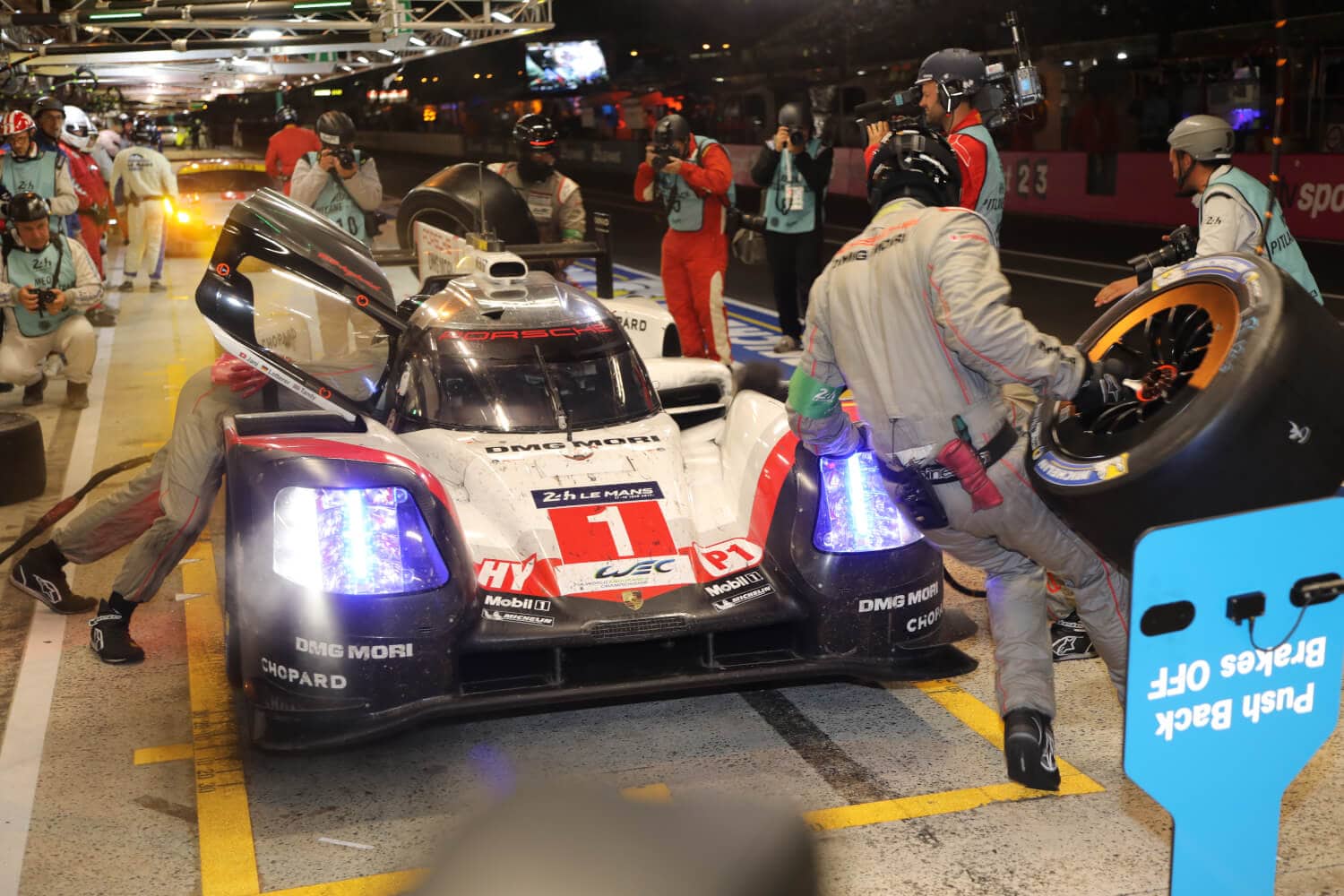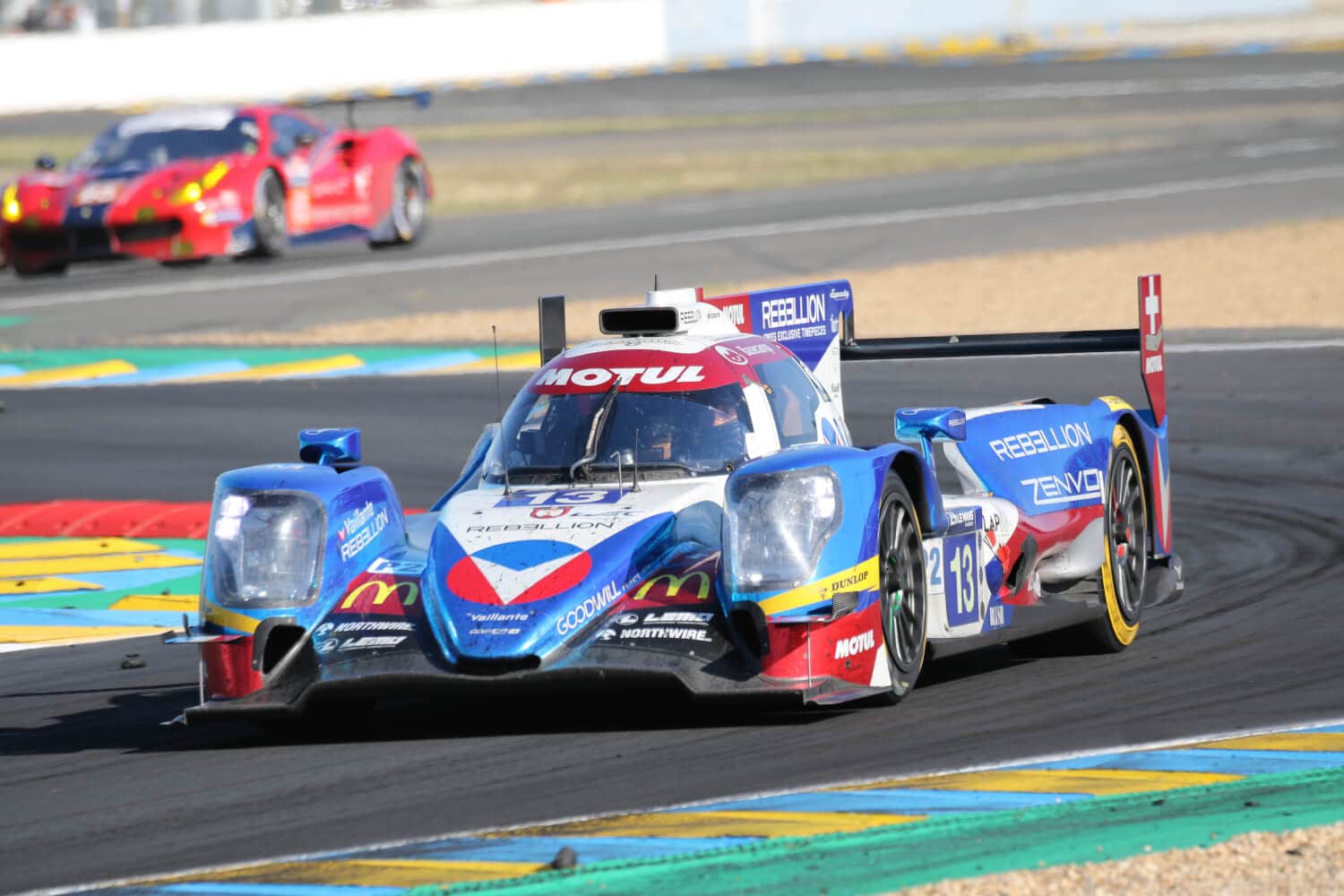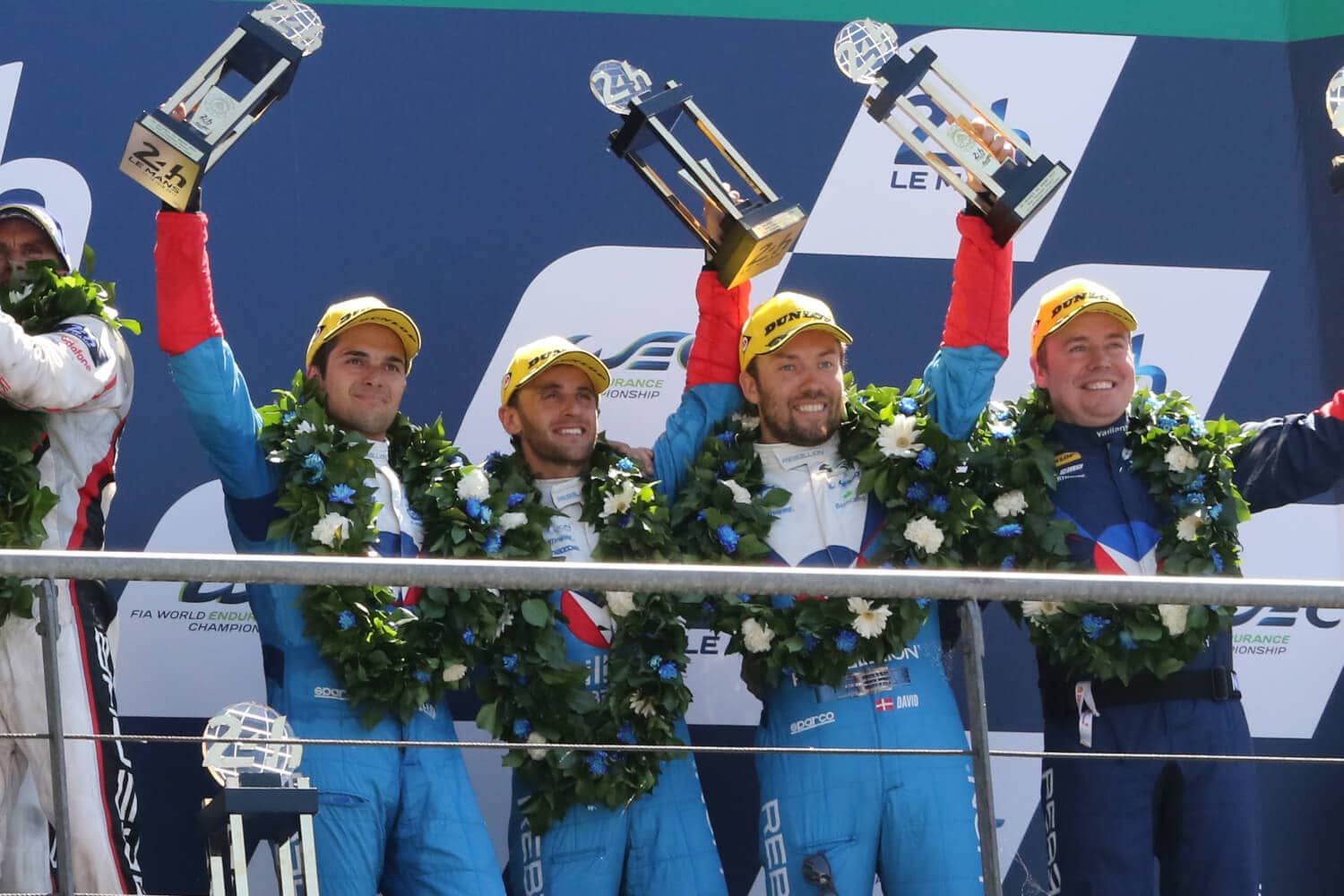24h Le Mans: Porsche wins fight for survival
24 HOURS LE MANS Toyota failed again at the 19th attempt and Porsche won for the 19th time despite a one-hour repair stop. No one had the overall winners on their minds after four hours. The three stars Buemi, Jani and Fässler had little reason to be happy. With Porsche and Toyota, there were only two manufacturers with a total of five [...]

Porsche and Toyota were the only two manufacturers with a total of five hybrid prototypes in the LMP1-H class on the grid. However, all of them experienced major problems over the longest distance. And that made for an incredibly dramatic and exciting race with an unexpected outcome in front of around 258,000 spectators over all days.
After three and a half hours, the hybrid system for recovering braking energy on the front axle had to be replaced on the #2 Porsche. The one-hour repair meant that after four and a half hours it dropped to 56th overall out of 60 teams that had started. The gap: 18 laps to the leading quartet of three Toyotas and the second-placed #1 Porsche of Neel Jani, Nick Tandy and André Lotterer.
The first of the five complex hybrid prototypes seemed to have fallen out of the running for overall victory. However, Le Mans writes its own history every year. And as in the previous year, it took incredible twists and turns in the 85th edition of this fascinating endurance race.

Sébastien Buemi: A trophy and fastest race lap
Shortly before the end of the 8th hour, the #8 Toyota TS050 Hybrid of Sébastien Buemi, Anthony Davidson and Kazuki Nakajima needed a repair for the same reason as the #2 Porsche before. Because the front hybrid system on the Toyota is more difficult to replace than on the Porsche 919 Hybrid, the time loss was around two hours.
Sébastien Buemi's dream of revenge for the victory he so narrowly missed out on in 2016 was over - there was no way he could make up this deficit. The driver from the canton of Vaud got the frustration and disappointment off his chest with the fastest race lap in the 23rd hour of the race, which took his car up to ninth place overall. As a consolation, he received a trophy for second place in the LMP1 class.
Even the Japanese Kamui Kobayashi, who went down in the annals with his fantastic qualifying lap, was no use to the pure speed of the 1,000-hp Toyota. Towards the end of the 10th hour, the leading car of Kobayashi, Conway and Sarrazin retired with clutch damage.
Toyota: Almost the same drama as last year
In the Toyota garage, there was similar bewilderment as a year ago - but they still had a third car in the race for the first time, which was in second place with a lap gap to the new leaders Jani, Lotterer and Tandy.
But a few minutes after the second came the third shock: Nicolas Lapierre collided with the LMP2 Oreca of Simon Trummer. According to the Bernese, whose excellent race (fourth intermediate in class) was over after a violent impact with the wall, it was the fault of the Geneva-based Frenchman.
Meanwhile, the CH/F dual citizen tried to drag himself to the pits, but the damage to the rear axle and the hybrid system was too great. At 1.50 a.m. it was clear that Toyota would not win again. Instead, Neel Jani and his two WRC regulars seemed to be heading for their second triumph in a row. Their lead was suddenly 8 laps as only LMP2 teams followed behind them.

Neel Jani: Retirement after huge lead
Despite a cautious and material-conserving driving style, their Porsche 919 Hybrid also failed to survive the full distance in midsummer temperatures. With 13 (!) laps to go, which corresponds to more than 170 kilometers, their car fell victim to damage to the primary drive (falling oil pressure in the 4-cylinder combustion engine) in the 21st hour. "We wanted to carry the car to the finish line... ", sighed last year's winner. "This time we didn't have the luck we had last year."

Suddenly, all the LMP2 cars were in the lead. With their 600-hp 4-liter V8 unit engines from Gibson, they were on average not a second per kilometer slower, but had to pit every ten laps for refueling. The almost 1000 hp LMP1s only pitted every 12 to 14 laps.
After the Toyota's double retirement, projections had already shown that the second Porsche team could ideally still move up to second place behind the leading sister team. In the end, this turned out to be the victory that had been considered impossible 20 hours earlier. The 19th for Porsche, the second for Timo Bernhard and Earl Bamber, the first for Brendon Hartley. Two New Zealanders on the overall winners' podium, something that had only happened before in 1966 with Chris Amon and Bruce McLaren on Ford GT 40.

Third place overall for Geneva's Mathias Beche
Jackie Chan Racing's Oreca-LMP2, which had been leading for a long time, finally finished second overall, one lap down, which is further ahead than any car from this class has ever been. At times, Rebellion's two Oreca-Gibson cars were in the top two positions here.
In the second half of the race, their problems and little issues added up, but it was enough for the trio with Geneva's Mathias Beche, Brazilian Nelson Piquet Jr. and Dane David Heinemeier Hansson to finish second in class and third overall. Hugo de Sadeleer from Vaud finished sixth overall with his LMP2 team at the first start at Le Mans, and Jonathan Hirschi from Neuchâtel eighth.
Marcel Fässler, who drove for Corvette Racing in the GT class this year, also had his sights set on a podium finish. He was on course until shortly before the end of the first third of the race before the Corvette with American Tommy Milner at the wheel was damaged in a spin into the wall.
The repair set his team back. Given the enormous power density in this class, the result was only 8th place among 13 GT factory teams. Victory went to an Aston Martin and second place to one of the four Ford GTs after a dramatic finish in which the second Corvette dropped from P1 to P3 in a direct duel.

Fight for world championship title relaunched
Thanks to the double world championship points for the quadruple distance of a usual 6-hour race, Porsche takes the lead in the manufacturers' standings from two-time season winners Toyota. The winning team also moves past the previously unbeaten trio with Buemi into first place in the drivers' standings, but its WRC chances are absolutely still intact with six 6-hour races still to go.
The retirement, on the other hand, means that Neel Jani's chances of successfully defending his title in the drivers' championship are dwindling. Last year, Le Mans brought a turnaround for the man from Lake Constance, as not much happened after his triumph in the world's biggest endurance race. Thanks to the points cushion from Le Mans, he still became world champion.
Perhaps it is now the other way around. From now on, Porsche will be competing with a completely new aero package, designed for more downforce for shorter distances. After the eventful 24 Hours of Le Mans 2017, no one should dare make any more predictions in this sport anyway.









